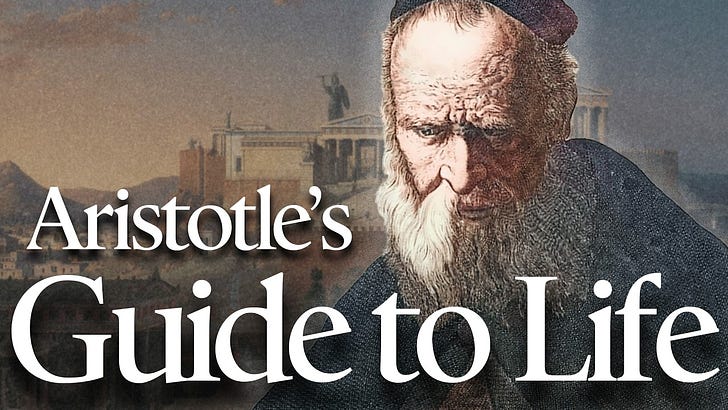Aristotle's Nicomachean Ethics: An In-Depth Explanation
The script, now available to paid subscribers.
I just released a new video over on my YouTube channel, all about Aristotle’s Nicomachean Ethics. I’m building on work that we did together this summer when we read the book.
Below, you’ll find a script — though it doesn’t line up word-for-word with the final video. Things change in the filming and editing, and I don’t go back and revise the script after that.
Every good work of philosophy is trying to answer a question. And for Aristotle’s Nicomachean Ethics, that question is simple: what is the best human life?And we’re going to answer that question with Aristotle today.
Instead of going book by book, we’ll talk about major themes of the book, like:
Happiness and the good life
The virtues
The disagreements between Aristotle and the Stoics
Aristotle’s theory of friendship
And the role of contemplation in the good life
But first we need to know who Aristotle was.
Aristotle and His Influence
Aristotle sits alongside giants of philosophy such as Plato, Kant, Hegel, and Spinoza as a wide-ranging, systematic philosopher. He was interested in quite literally everything.
Born in 384 BC, Aristotle studied at Plato’s academy for nearly 20 years. He eventually would go on to found his own school, the Lyceum, which survived until the Roman general Sulla destroyed it in 86 BC.
The followers of Aristotle in the classical world were known as the Peripatetics.
Like with Plato, it is difficult to overstate Aristotle’s influence in the history of ideas. His work on natural philosophy provided a framework for science until the early modern period with thinkers like Galileo; his work in metaphysics was the foundation of medieval philosophy and exerted considerable influence in the Islamic world as well; his work on logic wasn’t superseded really until the 19th century.
And that is the quick summary — Aristotle wrote on rhetoric, metaphysics, logic, biology, geology, meteorology, the list goes on.
Keep reading with a 7-day free trial
Subscribe to Commonplace Philosophy to keep reading this post and get 7 days of free access to the full post archives.



